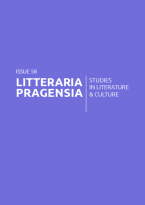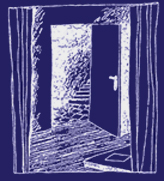
|
29.58 Avant-FuturesEdited by: Louis Armand & David Vichnar Volume: 29 Issue: 58 December 2019 |
Contents
|
Louis Armand
,
David Vichnar
Avant-Futures: In Lieu of an Introduction and not before Time
full article
metadata
|
1 |
|
Germán Sierra
Writing Noise: The Maze and the Drone
show abstract
full article
metadata
An interest in the abstract qualities of noise has been one of the features of avantgardist artistic movements during the twentieth and twenty-first centuries. For artists, noise has been an instrument for creation, a context for investigation, an aesthetical horizon, or the artwork itself. In this essay, the production of noise in contemporary literature – both performatively and semantically; by repetition, acceleration or nonsense – is studied by resourcing to two recurrent archetypes of noise: the cosmic labyrinth and the drone. Working around noise allows writers to liberate language from its informational features while retaining many of its cybernetic qualities, opening new ways for ananthropic – yet technical – speculation, and enabling the reclamation of the teratogenic virtues of cosmic spells and incantations.
|
7 |
|
Louis Armand
Alternative Three: Science Fiction in the Expanded Field
show abstract
full article
metadata
The abstraction of the ‘real’ by way of the genres of fictional and scientific discourse, and its return in the contested, perturbative interval affected between them – one which, at the same time, threatens to envelope and subsume them both – acquires a particular historical focus at that moment when History itself is declared to be at an end. The liminal arrangement of these terms has, from its beginning, been orientated in the anticipation, projection and transcendence of precisely such ends. Radically anachronistic, recursive and polysemic, ‘science fiction’ in its broadest ramification inaugurates – despite (or indeed, because of) its culturally diminished stature – a deconstruction of teleology, of instrumentalist reason, of techno-mysticism, of the ideology of mimēsis and of the metaphysics of presence. In its most incisive forms, it demands a thorough critique of those philosophies of the ‘virtual’ which had flourished at the close of the twentieth century, and of the ‘return of the real’ in those discourses of the Anthropocene that have dominated the twenty-first.
|
32 |
|
Amy Ireland
Alien Rhythms
show abstract
full article
metadata
From Deleuze’s reworking of Kantian schematisation to Mark Fisher’s theorisation of the weird and the eerie to the “zone” trope in contemporary science fiction, this essay examines ‘pathological’ productions of space and time first as rhythms, and then as sites of dread and desire. This paradoxical affect is owed to their alien, other, or “outside” status relative to, following Kant, the universal and homogenising “inside” of anthropic temporal succession and spatial co-existence. Their danger is apparent from the outset and yet they carry an irresistible allure for the various figures – professors, stalkers, scientists, tourists and travel guides – who find themselves under their spell. Functioning variously as alternative economies of material goods and genetic information, these alien rhythms concern transformation above all else. A transformation that involves great risk. But such is the cost of novelty.
|
58 |
|
Vít Bohal
Hacking the Syntagm: Xenofeminism against Paranoid Praxis
show abstract
full article
metadata
The following text aims to map Xenofeminism (XF; as defined by the Laboria Cuboniks collective) within two overlapping semiotic grids: the first is that of the canon of feminist critique and politics, and the second is that of discursive analysis focused on XF as platform for rewiring the cultural syntagm. The syntagm is here understood as commensurate with the imposition of Lacan’s Symbolic register. The description of “The Mirror Stage as Formative of the Function of the I” will be mined as a useful metaphor for illustrating the dynamics underpinning a certain strand of feminist theory and praxis. Reading the post-structuralist feminism of Irigaray and Cixous through the function of the Mirror stage will be used as a point of departure for analyzing XF as a project of open praxis, one which elides the fixation on essence and identity politics of much contemporary mainstream feminism through abducting the cultural syntagm. The Mirror stage will in this essay provide a primal scene for the meeting of feminist drive towards emancipation, the imposition of the Lacanian Symbolic, and the syntagm of code. Laboring at the intersection of politics and digital design, XF is no longer driven so much by Cixous’ gesture of flight from patriarchal syntax, but is rather predicated on cunning tactics, and on the cultivation of alternative codes which queer the patriarchal syntagm.
|
72 |
|
David Vichnar
"Long Live Futurist Prague!"
show abstract
full article
metadata
The article challenges the widespread notion, repeated in much literary history, regarding the non-existence or irrelevance of Czech Futurism. It traces the reception of Marinetti’s manifestoes through the pre-war and post-WWI context of Prague avant-garde, culminating in the Futurist leader’s triumphant visit to the city in 1921. It discusses the careers of S.K. Neumann, Otakar Theer, and Růžena Zátková, three important Futurist figures on the native avant-garde scene. It analyses selected mid-20s works by two most prominent Devětsil members, Vítězslav Nezval and Jaroslav Seifert, and brings into relief their Futurist poetics. Critiquing, in conclusion, Karel Teige’s anxiety of influence vis-à-vis the movement, the article shows that Futurism formed the very core of avant-garde theory and practice in 1910s and 1920s Bohemia.
|
83 |
|
Karl Wolff
The Dune Encyclopedia: A Future History in the Age of Mechanical Reproduction
show abstract
full article
metadata
This article investigates the fluctuating bifurcated nature of The Dune Encyclopedia, by Willis E. McNelly, both as a prized pop culture collector’s item and as an in-universe critique of God-Emperor Leto II’s theocratic totalitarian ersatz monarchy. Marx’s concept of the commodity and Walter Benjamin’s aesthetic theory about art objects first being cult objects are overlaid on a modern analysis of pop culture fandom and the interconnections between the disruptions of free market capitalism and corporate control of fictional narratives.
|
105 |
|
Dustin Breitling
The Derivative Condition
show abstract
full article
metadata
The derivative condition explores the nature of the Contemporary understood through its respective relationship with Modern and Post-Modern Art to grasp how the distinguishing feature of our era becomes characterized as an infinite reproduction of contingency and risk that intimately mirrors the logic of financial capitalism. Undertaking a survey into the financial instruments of derivatives as vehicles for temporally mining the future and formalizing a globalized risk-economy, subjectivity also becomes another site transformed through their interpenetration into everyday life. Yet, through the emergence of blockchain technologies, it is evaluated here how their employment becomes a possible antidote to counter the corrosive effects of finance and to possibly seed alternative social-binding organizations and temporalities.
|
118 |
|
Louis Armand
,
Vít Bohal
,
Mario Giampaolo
,
Alessandra Romano
Multilogue: Perspectives on Computational Thinking and Its Utility for Transformative Education
show abstract
full article
metadata
The following text is a collaborative multilogue between the Centre for Critical and Cultural Theory at the Department of Anglophone Literatures and Cultures (Charles University) and the Department of Education, Human Sciences and Intercultural Communication (University of Siena). It focuses on the affordances and dispositions of computational thinking within education and unpacks the recent calls for critical reflection within the field of the digital humanities. The initial impulse for assembling this collaborative reflection came from the European Liberal Arts Network program intended to foster inter-institutional exchange and collaboration.
|
126 |
|
Review of
Linda Chavers
Violent Disruptions: American Imaginations of Racial Anxiety in William Faulkner and Richard Wright
Linda Chavers, Violent Disruptions: American Imaginations of Racial Anxiety in William Faulkner and Richard Wright. New York: Peter Lang, 2019. 111+xxi pp. ISBN: 978-1-4331-4218-5.
full article
metadata
|
138 |
|
Notes on Contributors
full article
|
142 |


